The script of the childrenís play: Harrison!
Cast
|
|
Minor Parts
|
|
Groups of about five
|
|
Groups of three
|
|
With the exception of John and William Harrison, Nevil Maskelyne and the Narrator, parts can be doubled or tripled. The Questioner could be played as if a pupil or a member of the audience.
Harrison!
| Backdrop: a large map of the world with the lines of latitude and longitude. Underneath will be a large image of H4, which will be uncovered when Harrison sends it on the West Indies sea trial. To show time passing dates are announced using silent placards at strategic points. |
|
| Scene 1 | |
| The Board of Longitude (astronomers, naval captains etc.) enter | |
| BoL | (In unison, or divided between cast) Typical ignorance! |
| BoL 1 | He didnít invent it Ėwe all knew about it for hundreds of years. |
| BoL 2 | We just couldnít measure it accurately. |
| Maskelyne | I still say I could have measured it if it hadnít been for that uppity clockmaker. |
| BoL 1 | Quiet Maskelyne, weíll come to that later. |
| Questioner | I donít understand. |
| Enter Ship holders with cut-out ships | |
| BoL 2 | (using map and cut-out ships to demonstrate) Right! Pay attention. This is latitude. These are imaginary lines which go from east to west. These lines measure longitude. They go up and down, from north to south. Are you with me? |
| Questioner | Just about. |
| BoL 2 | Imagine these lines are real and that by working out where they would be, you can tell where you are when you are in the middle of the ocean. |
| Questioner | So what was the problem? |
| BoL 2 | We are all right with latitude... The distance between the lines remains the same so we can work out where we were using the fixed patterns of the stars and the sun. Longitude is a bit more difficult. Now listen - I am only saying this once. We know that for every 15 degrees of longitude there will be an hourís difference in time, because thatís the way the world goes round. If we can measure the time between when we set off and where we are now, we can work out where we are. Simple! |
| Maskelyne | And we can calculate that from the moon, the stars. |
| Ship holder 1 | Up to a point. If the weather is bad, or a ship is in a storm we canít even see the stars. And frankly the clocks we had canít keep good time. |
| Ship holder 2 | They got damp or too hot and a pendulum canít work at sea. |
| Ship holder 3 | Often we didnít have a clue where the stars were. |
| Ship holder 1 | Or where we were. |
| Questioner | So why did that matter? |
| BoL 1 | (remarks illustrated by cast members) Trade ships with silks, jewels and spices tended to keep to the routes they knew, so it was easy for pirates to lie in wait. |
| BoL 2 | If a ship was caught in a storm, it found it very difficult to get back on track Ė men could starve to death, lost at sea. Or even worseÖ |
| (Exit BoL) | |
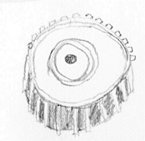
| Scene 2 | |
| Narrator | In 1707 a warship with Admiral Sir Clowdesly Shovell on board returned from battle with the French. |
| Sailor 1 | He led a fleet of four warships. There were over 2000 sailors on those ships. |
| Sailor 2 | We won some battles too. |
| Sailor 1 | And lost some. |
| Sailor 3 | And now weíre going home |
| All cheer | |
| Cloudesley Shovell | Silence or I will have you flogged! |
| Sailor 3 | Thatís him. Admiral Cloudesley Shovell. No, I donít know how to spell it either. |
| Grey gauze drawn across stage; sailors try to peep over it. | |
| Narrator | Thick fog engulfed them. They could no longer see to navigate by the sun, moon and stars. |
| Sailors with telescopes, quadrants (mimed or made) look in all directions. | |
| Sailor 4 | (Quietly makes notes and consults charts.) |
| Narrator | Confusion ran through the ship. |
| CS brings his officers round him | |
| CS | (Consult the charts) By my reckoning we are here! All is well. |
| Officers | (Look at each other doubtfully then nod vigorously) Yes indeed. We agree, Captain. |
| Sailor 4 | (approaches) With respect Sir, do you know where we are? |
| Everyone freezes | |
| CS | What? Yes, of course I do! |
| S4 | I think we are heading for the Scillies. |
| All whisper ĎThe Scilly Islesí in horror. | |
| Ship holders | Tiny islands. A row of jagged teeth ready to rip a shipís hull apart. The graveyard of many a good ship And of many a brave sailor. |
| CS | How dare you question me? You know that is against all the rules! Men, throw him over board. |
| Sailors hold S4. | |
| S4 | We are too far west! |
| CS | Clear the decks ready for this man to be thrown overboard! |
| All | Aye Aye, captain. |
| S4 is thrown over board. | |
| S4 | (As he drifts off) But I was rightÖÖ. |
| Narrator | It was a painful death. Over 2000 sailors died, only 26 people survived. |
| Ship holders disintegrate and turn into beach-combers; sailors drown. Music. Beach-combers rake amongst the bodies. CS groans and moves as beach-comber carrying shovel comes up to him. She lifts his hand to look at the ring. He groans - obviously alive. |
|
| Beachcomber | Hmm. Nice ring. (She hits him on the head with her shovel) Good job Iíve got my shovel with me. Very nice ring indeed. You donít need it any more. Iíll take that to market and sell it. |
| Narrator | Thatís just one example. There were so many other tragedies too. |
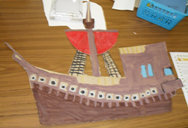
| Scene 3 | |
| Enter Admirals / Merchants | |
| Merchant | There seemed to be no answer. We were losing cargoes. |
| Admiral | We were losing ships! |
| Sailors | We were dying. |
| All | So, in 1714 we went to Parliament to DEMAND ACTION. |
| Enter Politicians | |
| All apart from Politicians | You have got to solve the problem of longitude. |
| Politicians go into a grumbly huddle | |
| Politicians | Weíll form a committee and report back next year. |
| All the others | No! ACTION! NOW! |
| Politicians back in huddle | |
| P1 | How can we solve it? |
| P2 | We could have a competition. |
| P1 | What do you think? |
| P3 | My wig is itchy. |
| P2 | (Pushes it down) Concentrate, will you! |
| P3 | I canít see now. What is longitude anyway? |
| P2 | Donít you ever listen? |
| More mumbling | |
| P1 | Right! I have been told that we should have a competition and we should open it up to everyone in the land, not just the astronomers. |
| Maskelyne | No we should not! |
| Everyone else | yes we should! |
| Short burst of argument | |
| P1 | Order! The competition will be to create a clock. It must be practical, useful and accurate to within 3 seconds a day. |
| P2 | We will create a board of longitude to judge the competition. It will be contain scientists, naval officers and Government officials. The astronomer royal will lead it |
| Maskelyne | (mutters) Good! |
| P2 | There will be a reward of £20, 000. |
| All | £20,000! |
| P3 | (Aside to audience) Thatís over a million pounds in todayís money! |
| Maskelyne | No one can make such a clock. The answer is in the stars |
| Scene 4 | |
| Narrator | For a long time, it looked as if the astronomers were right. There were many attempts. . |
| Inventors come before the BoL | |
| Inventor 1 | I will place ships at each point of longitude. They will stay there and each one will fire cannon at noon. Ships will hear the cannonís boom and know it is noon! |
| BoL | Next! |
| Inventor 2 | I will divide the sky into 125 million squares which sailors will learn by heart Ö. |
| BoL | Next! |
| Sir Kenelm Digby | Sir Kenelm Digby at your service. Youíre going to love this (He whistles and Assistant enters with dog) |
| Sir K | (He presents his case like a magician) I have here my miraculous Powder of Sympathy, with which I have solved your problem. (Produces knife) |
| Dog | I donít like the sound of this! |
| Sir K | Wound the Dog precisely as the ship sails at noon. |
| Dog | (Howls) Ouch! That hurt! |
| Sir K | I simply introduce my wonderful sympathetic powder to the wound. This powder heals at a distance. I will sprinkle the powder onto the knife every day at noon and wherever the dog is, it will feel the sting of its healing power, and yelp. Everyone will know when it is noon back home, because the dog will cry out, and then they can work out their longitude. Of course, the wound needs to be kept openÖ |
| Dog | Ugh, gross. Iím off. (Drags assistant off with him) |
| BoL | Get this idiot out of here! Next! |
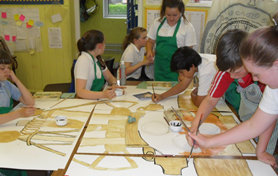
| Scene 5 | |
| Q | This is all very interesting, but what about Harrison? |
| Narrator | I was coming to that. Letís go back in time and meet the Harrison family. |
| In a swift sequence, the family members enter one by one making a still image. Placards give dates. Narration can be done by family members or separate narrators). | |
| Mother | (With baby in arms) Elizabeth Harrison. Mother and housewife. Married to Henry Harrison. I gave birth to five children. Four survived. John, Mary, Henry James. John, the eldest was born in 1693. (Children add themselves into picture) |
| Narrator as Henry | Henry Harrison. Carpenter by trade. Moved to Barrow about 1697, when my son John was about 4 years old. |
| Narrator | As a child John Harrison helped his father with the woodwork. |
| Mother | John go and helps your father and James. Stop tinkering around with that. |
| Narrator | We donít know very much about him, but stories tell us that he was very curious and would take things apart to understand how they worked and then put them back together perfectly. |
| Mother | Youíll break it! |
| John | No, I wonít. |
| Narrator | And he never did. There was no school in Barrow, but he learned to read and write and had to be good at arithmetic to do carpentry and joinery. He grew up to be a good carpenter, making farm equipment, wheels and helping his brother James make the frames for the huge heavy bells which rang in the church steeples. |
| Mother | He loved music and played the viol, a larger version of the violin. He even led the local choir. |
| Narrator | He had no scientific education at all, but when he was a teenager a clergyman came to visit and noticed him. |
| Clergyman | You seem very keen on learning how things work. Let me give you this book. I think you will find it interesting. |
| John | Lectures on Mechanics and Natural philosophy delivered by Nicholas Saunderson, Mathematician of Cambridge University. I cannot thank you enough. I will treasure this all my life. |
| He is so engrossed in the book he barely notices the clergy man say goodbye and leave). | |
| James | John, JOHN! Can you help me make these bell frames? I really need them finished. We need to balance them properly. Put the book down! |
| A bell frame image is created by bodies of family etc. John looks at it. | |
| John | The bells need balancing in the same way a clock pendulum does. Interesting. |
| Narrator | No one knows what prompted John to make a clock. Some say itís because a pocket watch under his pillow comforted him as a sick child. Others think that living by the river Humber he would have known about the longitude problem and been thinking about it already. He made his first clocks for family and friends. These clocks were made almost entirely from wood. He worked with precision the clocks kept very good time. |
| F1 | Can you make me a clock? (Placards 1713) |
| F2 | Can you make me and my sister a clock? (1715) |
| F3 | Can I have a nice clock for my mantelpiece? (1717) |
| John in his workshop. James and his mother come to see what he is doing. | |
| James | What are you making John? |
| John | James, Iím making plans. |
| Mother | You always are, John. You always are. |
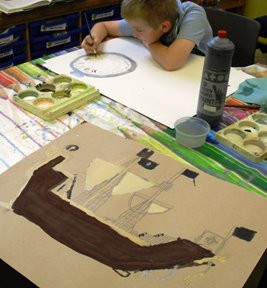
| Scene 6 | |
| Narrator | Word got round in Lincolnshire. John Harrisonís clocks kept the best time. One day he had a visitor. |
| 1722 placard /John in workshop | |
| Sir Charles Pelham | Good day John Harrison. I hear you make the best clocks in the area. |
| John | I believe I do |
| Sir Charles | I own Brocklesby Park. I need a new clock for the tower of my stable block. I want it to keep good time and I donít want it to stop. Is that too much to ask? |
| John | Not at all. I expect my clocks to run for at least 200 years, if they are cared for. |
| The following to be accompanied with images /props to create the clock. | |
| Narrator | John Harrison used the Brocklesby Clock to try out new ideas and techniques. From then on he revolutionised clock making. Remember, John was a carpenter. His mind was practical as well as inventive. He used lignum vitae. This wood contains its own oils. It never needs oiling. He knew the strongest parts of wood. He made wooden cogs that fitted exactly, from the strongest parts of the timber. He invented a small metal contraption to help the pendulum move without slipping. He called it the grasshopper escapement. The pendulums on his clocks were made of steel and brass. Using the two metals meant the pendulum did not shrink or expand when hot or cold, so the clocks kept good time. His brother James helped him. |
| James | We tested the accuracy of our grid-iron grasshopper clocks against the movement of the stars. We used our neighboursí window as a grid. |
| Elizabeth & William | And what about us? We helped too. |
| Narrator | Who are you? |
| Elizabeth | His wife. Did he forget to tell you he was married by now? Typical! |
| William | His son. We come into story too. |
| Narrator | By 1726 John Harrison, country tradesman and local choir master had made a clock that lost only one second a month. The best time keeper in the entire world. And he had heard about the Longitude Prize. |
| Elizabeth | what are you doing John? |
| John | Iím making plans. |
| All | What plans now? |
| John | My clock keeps excellent time, but still has a pendulum. Thatís useless at sea. I am going to make a clock without a pendulum that will work on a ship in all conditions. Hot, cold, calm or stormy. I am going to win the Longitude Prize. Itís time. |
| Elizabeth | Time for what? |
| John | Time to go to present our ideas to the board of Longitude. Time to meet the Astronomer Royal. Time to go to London! |
| All exit | |
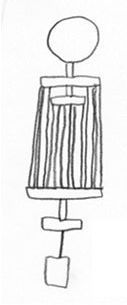
| Scene 7 | |
| Family centre stage, looking round. Busy London scene - calls from the cast seated around the sides. |
|
| Watch where youíre going! Make way, coach coming through! Any spare change, Guv? Fresh fruit here! Buy my violets, penny a bunch! This aleís been watered down! Stop, thief! Laces and ribbons! Brick dust to sharpen your knives! |
|
| Two or three cast members cross stage, too busy to stop. Family try to ask them the way to the Astronomer Royal, but no avail. |
|
| John | Stop! I demand to see the Astronomer Royal. |
| Halley | That would be me - Edmond Halley at your service. What can I do for you? |
| Narrator | John Harrison showed his plans to the astronomer royal. Halley was impressed. |
| Halley | Iím impressed. But you know, the Board of Longitude wonít like it. We believe the answer lies in mapping the heavens. Before you meet them, Iíd like you to see a friend of mine, George Graham. The finest clockmaker in London. |
| Narrator | They met at 10 oíclock in the morning. At first John was reluctant to show George Graham his plans. He was scared he would steal them. That changed. |
| George Graham | I am amazed. These are revolutionary designs. You need money to develop your ideas, I will lend you the money to make this clock. (pause) Goodness, itís after 8 oíclock! You must stay to dinnerÖ |
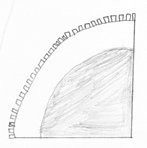
| Scene 8 | |
| Narrator | John Harrison returned to Barrow to make his first sea clock. His brother James helped him. |
| Placard: Four Years Later H1 clock parts /people put into place on stage. Tableau of family gathered round clock. |
|
| William | Right, I think itís complete. Ready? |
| John | Come on, James. We need to test our first sea clock on the Humber. |
| Cast create Humber, clock rocking in the water. Family checking time against the sun. | |
| James | It is still keeping time to one second a month.. |
| William | Back to London? |
| John | Yes. This time we will ask for a trial at sea. |
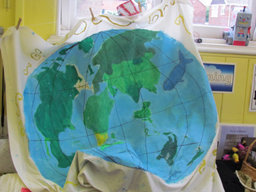
| Scene 9 | |
| Narrator | It took John Harrison a year to get permission for the sea trial. The voyage was to Lisbon, not the West Indies. |
| Captain Proctor | Captain Proctor at your service. Welcome aboard the Centurion. I will do everything I can to help, but I fear what you are trying to do is impossible. The shocks and movement of the ship will make it too difficult for your clock to keep time. |
| Cast form the clock and ship; the ship casts off. The sea is calm, but gets rougher. JH is very sea sick.) Captain Proctor stands firm throughout. |
|
| Captain Proctor | Mr Harrison. It seems that your clock can cope better with the roll of the ship than you can! |
| Harrison groans | |
| Narrator | The return journey took place four days later with Captain Wills. He wasnít impressed to have Harrisonís clock on board. |
| Captain Wills | I donít think I will need your clock to guide me. |
| John | Weíll see. |
| Narrator | The crossing was rough. Gales and storms meant navigation was difficult. |
| Captain Wills | Ah, we are nearing home at last by my calculations we are on course for Dartmouth. |
| John | Going by my sea clock we are 60 miles west by the Lizard and in danger of the rocks there. We need to change course. |
| Captain Wills | Donít be ridiculous. I am the captain of this ship and I give the orders. |
| Sailor | Land ahoy!! |
| Captain Wills | What do you see? |
| Sailor | Looks Like the Lizard, Sir. Sorry sir. |
| Captain Wills | Oh. (pause) Well, John Harrison. I doubted you, but I admit I was wrong. Your clock has proved its worth. I will certainly write to tell the Board of Longitude. |
| They shake hands and part. | |
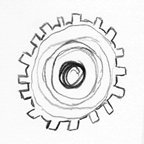
| Scene 10 | |
| The Board of Longitude. Placard: 1737 |
|
| BoL 1 | Well Mr Harrison, you appear to have proved something with your strange clock. The Admirals are very pleased with the results. |
| John | Thatís as maybe but I think I can do better. I already have ideas to improve my time keeper. Give me the money and I will give you a better clock. |
| BoL look at each other. | |
| BoL 2 | We are prepared to continue to finance your work, but you must understand that what you produce belongs to us. |
| BoL 3 | After your second clock has made its sea trial, you will hand over the clocks to us. |
| William enters. | |
| William | So we stayed in London and I helped my father with his work. Sometimes I envied my uncle James, who stayed in Lincolnshire. |
| Placard: more time passesÖ | |
| BoL | Well? What about the second clock? |
| John | I want to make another one I need more money. I know I can still improve how the sea clock works |
| William | Is the clock to go to sea, Father? |
| John | No, William. |
| William | But the Royal Society tested it and found it accurate. It took us five years to make! |
| John | ButÖ itís not perfect. Now we must get back to work on one more clock. |
| Freeze as Maskelyne enters and looks at them. | |
| Maskelyne | This man is no scientist. He is not even educated. I and my fellow astronomers have worked for years to make a map of the moon and the stars to guide sailors home. It is nearing completion. How can this carpenter expect to compete with our centuries of knowledge? He will never finish his work. I will win the Longitude Prize. |
| Narrator | Thatís Nevil Maskelyne. In his own way, he was as passionate about solving the longitude problem as Harrison, and as determined to win the prize, using the lunar method. Meanwhile both men continued their work. |
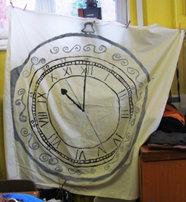
| Scene 11 | |
| William | You could say I grew up with the third clock. We spent nearly twenty years on it. My father called it his curious machine. He reduced the clock design to a manageable size. He got rid of any sort of pendulum and he dealt with the problem of temperature by using a strip made of two metalsÖ |
| Narrator | That invention still works today. We still use the bimetallic strips John Harrison invented to regulate the temperature in our kettles and other machines. |
| William | He was never satisfied. Even before the third clock was finished he had started on a completely new version. This time he based it on a pocket watch. The fourth clock was really a big pocket watch: not too large, easy to carry around, with all the workings safely tucked up inside the watch casing. It was beautiful. |
| BoL gather to look at the watch. | |
| BoL 1 | We agree to try this watch on a voyage to the West Indies. |
| BoL 2 | It must be under the strictest conditions. |
| BoL 3 | It will be placed in box with four locks |
| BoL 1 | William Harrison will have one key |
| BoL 2 | The governor designate of the West Indies will have the second key. |
| BoL 3 | The shipís captain, Dudley Diggs, will have the third and his first lieutenant will have the fourth. |
| BoL 2 | Two astronomers will check the time of departure and arrival at each port. |
| BoL 1 | That way there can be no funny business. |
| William and John look offended. | |
| Scene 12 | |
| Narrator | The voyage took place in 1761 on the HMS Deptford. John was getting older then, so it was William who sailed. |
| Dudley Digges | Welcome aboard ship, William Harrison. I canít see how that oversize watch is going to help us, but letís get going. |
| Cast sing a verse or two of ĎWhat shall we do with the drunken sailor?í while sailors come on board and the ship sets off. Sailors drink Ė but the beer is bad Ė appropriate reactions. |
|
| Sailors | We canít drink this! |
| Dudley Digges | Well, drink the water. |
| Sailors | The water is disgusting. We need something we can drink. |
| Dudley Digges | Donít you dare question my orders. We are far from land. You will have to put up with it, or I will consider it mutiny. |
| William | Actually, Captain Digges, we arenít that far. By my reckoning we can put in at Madeira tomorrow and pick up new provisions. |
| Dudley Digges | (Looks at sailors) Do you hear that men? According to our experienced navigator with his new watch, we are going to be fine. Very well Mr Harrison, we will follow the course you recommend. Put your money where your mouth is. I bet you we donít make Madeira, or any way near it. And it wonít be my fault. |
| Group tableau. Sailors look at Will, then out to sea, apart from one who is Look Out. Dudley Digges looks smug. Cast Ďtick tock Ď. Sailors start to lean into to William, looking angry. | |
| Look-out | Port ahead! |
| Sailors cheer. William is very relieved. Dudley Digges is astonished and then shakes his hand. | |
| Dudley Digges | Mr Harrison. I am an honourable man. Not only have you won our bet handsomely, but I would like to buy one of your time keepers as soon as they become available. |
| Narrator | When the ship returned to Britain the watch had kept excellent time. Over 4 months, through heat waves and raging storms, it had lost less than two minutes. And you would think that our story would end there, with John Harrison receiving the prize for his lifeís work. ButÖ |
| William stays on stage and John joins him. They are excited; they think they have won. | |
| Scene 13 | |
| BoL 1 | We need three more mathematicians to check your calculations and readings. |
| BoL 2 | As we thought. Insufficient readings. |
| BoL 3 | Did you measure the longitude of Jamaica by the eclipses of Jupiterís moons? |
| BoL 1 | No? Oh Dear. You were meant to do that |
| William | You didnít ask me to! |
| Maskelyne | And I have completed my lunar tables, The British Marinersí guide. Any claim for the prize must be measured against those calculations. |
| BoL 3 | You will just have to do it all again. After all, it may just have been a fluke. |
| Scene 14 | |
| Narrator | In 1764 William and a friend took the watch on a second sea trial to the West Indies. They landed in Barbados. |
| William | We need to find the astronomers to compare our calculations. Ah! Thereís the observatory theyíve set up. |
| Maskelyne enters - Friend sees him. | |
| Friend | Um, William, I donít know how to put thisÖ |
| William | What! How is that allowed? You canít possibly judge my calculations fairly. |
| Maskelyne | Donít you dare talk to me like that. I have every right to be here. Now if you donít mind. I have readings to take. I suggest you do the same. |
| Friend watches Maskelyne take readings. | |
| Friend | I wouldnít worry William. I think heís a bit flustered. I think heís made a mistake. |
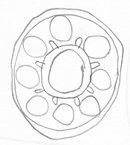
| Scene 15 | |
| John and William wait for BoL. | |
| John | Finally. Itís been months. |
| BoL arrive | |
| BoL 1 | You tell him. |
| BoL 2 | No, you do. |
| Mumblings. | |
| BoL 1 | It is the unanimous decision that the time keeper has kept its time with sufficient correctness. BUT you will be given only half the prize money. |
| BoL 2 | The other half will be given to you after you have handed over all the sea clocks their designs and plans and made two more copies of H4 , to prove to us that the design can be duplicated. |
| John | Not as long as I have a drop of blood in my body! This is outrageous! Come on William. |
| William | I want to speak to the Astronomer Royal. |
| Maskelyne | Yes, Mr Harrison? Here I am. |
| William | I might have known! |
| Narrator | In the end John had to give in. He dismantled his beautiful watch to show everyone how it was done and handed over the clocks. Nevil Maskelyne supervised the procedure himself. |
| John | I donít want to watch. |
| Maskelyne | I will test them at the Greenwich observatory (sound of crashes) OOPs! |
| Scene 16 | |
| Narrator | Arguments between the Harrisons and The Board of Longitude rumbled on. Harrison did make one duplicate, as precise and accurate as H4. |
| Maskelyne | If this watch is to be useful at all, other people must be able to able to make it. I have asked Larcum Kendall to make a copy using John Harrisonís designs. |
| Larcum Kendall enters. | |
| John | I respect your work , Mr Kendall. There is no one I would rather make a copy of my watch. I am 79 years old. I do not think I will make another. |
| William | I have had enough of this. I am writing to the King. |
| All exit except William. King George joins him. | |
| William | So you see Your Majesty, my father has made this his lifeís work Ė and he has been successful, but is denied his reward. |
| King | These people have been cruelly treated. By God, Harrison! I will see you righted. Let me test the watch. |
| Parliamentary noises from all cast. Prime Minister takes stage. | |
| King (to Politicians) | I have tested this watch with my personal scientists And can confirm that it is accurate. I request justice for this gentleman. |
| John | I am an old man. I have devoted my life to solving the problem of longitude. I have had success which has been recognised by sailors. I wish to claim the rest of my prize, for my own efforts and for my family. |
| Prime Minister | Parliament has voted to present John Harrison with £8750, in recognition of his efforts to solve the longitude problem. |
| All | Hear! Hear! |
| Narrator | John Harrison never quite won the Longitude Prize as such. The money was awarded by the benevolence of parliament. The prize itself was never won. Larcum Kendallís copy of H4 was tested by Captain Cook and taken on all his voyages. John Harrison died in 1776, but not before he knew that Captain Cook had said. |
| Captain Cook | It would not be doing justice to Mr Harrison and Mr Kendall if I did not own that we have received very great assistance from this useful and valuable timepiece. Our trusty friend, our never failing guide, the Watch! |
| The End |
